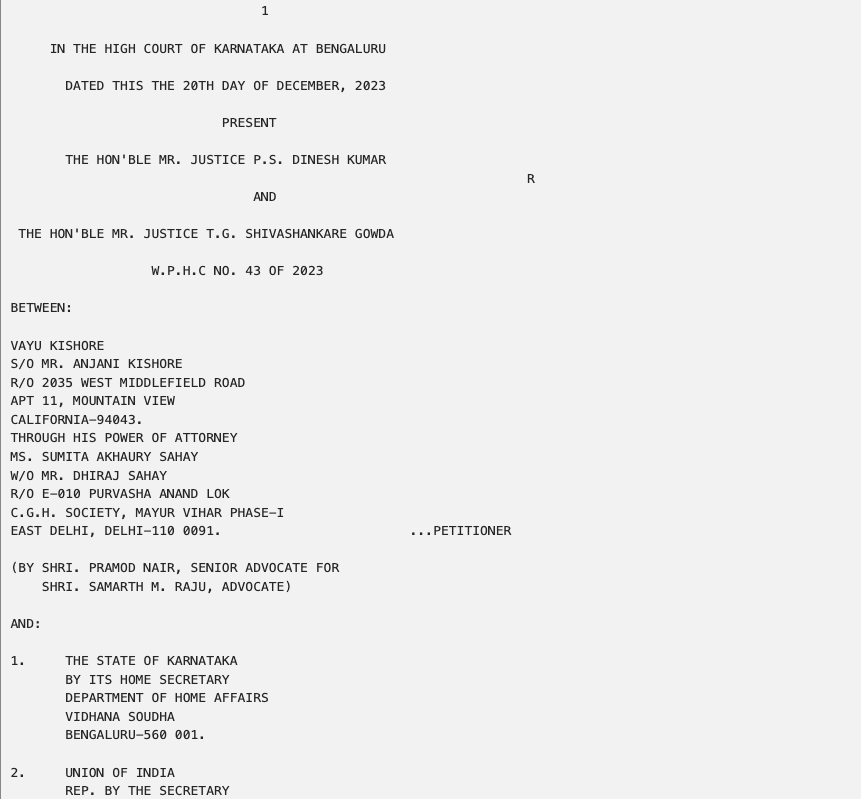Introduction
The case of Vayu Kishore vs. The State of Karnataka revolves around the custody dispute of a minor child, Miss Vindhya Kishore, between her parents, Vayu Kishore and Abhilasha Sharma. This writ petition was filed by Vayu Kishore, the father, seeking a writ of habeas corpus to produce the minor child before the court and repatriate her to the USA in compliance with a foreign court order.
Background
Vayu Kishore and Abhilasha Sharma were married in the USA and had a daughter, Vindhya, who was born in 2019. The family resided in California until marital discord led Abhilasha to separate from Vayu. She moved out with Vindhya, eventually filing for divorce and seeking sole custody of the child. A court in California issued a custody order granting joint legal custody to both parents and imposed travel restrictions. Despite these restrictions, Abhilasha moved to India with Vindhya, leading Vayu to file this writ petition.
Key Arguments
Petitioner’s Arguments
- Illegal Removal: Vayu argued that Abhilasha illegally took Vindhya to India without his consent, violating the foreign court’s custody order.
- Cultural Adaptation: Vindhya, being a US citizen, is accustomed to the cultural and social environment of the USA.
- Untraceable Status: Despite numerous attempts, Vayu has been unable to locate Abhilasha and Vindhya in India, indicating illegal detention.
- Better Prospects in the USA: Vayu, employed by Google LLC, can provide a stable and productive environment for Vindhya’s upbringing.
- Non-compliance with Court Orders: Abhilasha’s actions contravene international travel laws and US customs regulations.
Respondent’s Arguments
- Custody with Biological Mother: Abhilasha contended that Vindhya is with her biological mother, and thus her custody is not unlawful.
- Child’s Welfare: Citing the Hindu Minority and Guardianship Act, Abhilasha emphasized that the custody of a minor under five years should ordinarily be with the mother.
- Safety Concerns: Abhilasha claimed that Vindhya faced neglect and possible abuse while in Vayu’s custody, which prompted her move to India.
- Settled in India: Vindhya has adjusted well in Jamshedpur, attending a reputed school and forming peer relationships.
Court’s Observations
The court noted the following key points during the hearing:
- Citizenship and Cultural Ties: Vindhya’s citizenship and cultural ties to the USA were significant but needed to be balanced against her welfare.
- Best Interests of the Child: The child’s best interests are paramount in custody disputes, requiring careful consideration of her current environment and potential future.
- Allegations of Neglect: The allegations of neglect and abuse in Vayu’s custody were serious and needed thorough examination.
- Legal Precedents and Jurisdiction: The court examined relevant legal precedents and the jurisdictional authority of foreign court orders in Indian legal context.
Court’s Decision
The court, after considering the arguments and evidence, ruled that:
- Custody to Remain with Mother: Vindhya’s custody should remain with Abhilasha, her biological mother, citing the child’s best interests and the need for maternal care.
- Visitation Rights: Vayu was granted visitation rights and encouraged to maintain regular contact with Vindhya to ensure her emotional well-being.
- Review of Custody: The court ordered a periodic review of the custody arrangement to monitor Vindhya’s welfare and any changes in circumstances.
Conclusion
The case underscores the complexity of international custody disputes, particularly when involving conflicting court orders from different jurisdictions. The court’s decision prioritized the welfare and best interests of the minor child, emphasizing the need for stability and maternal care. The ruling also highlighted the importance of maintaining the child’s cultural ties and emotional connections with both parents, while ensuring her safety and well-being in the current environment.
References: https://indiankanoon.org//doc/103328271/
